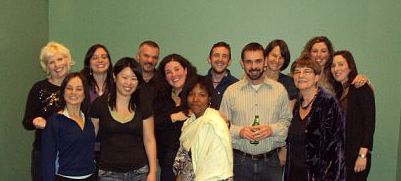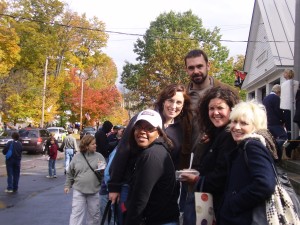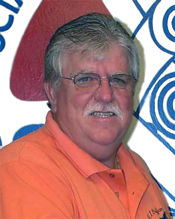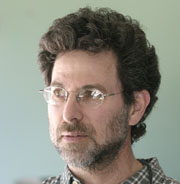Good Luck Stephanie!
August 5, 2010
For Stephanie Luce, this summer’s ULA session marked the last as a full-time faculty member at the UMass-Amherst Labor Center. Starting in the fall, she will be on faculty at the Joseph S. Murphy Institute for Worker Education and Labor Studies in New York City.
In her years at Gordon Hall, Stephanie began working at the Political Economy Research Institute before being hired as a professor at the Labor Center. Her research most frequently focused on living wage movements, but she also published research and advocated for international labor movements. Stephanie was an active member and former leader in the Massachusetts Society of Professors, the UMass faculty union.
She taught in both the residential and ULA programs, and will also be remembered as a supportive advisor and mentor for many M.S. students.
Stephanie will be sincerely missed at the Labor Center. Faculty, staff, students, alumni, and friends in Western Massachusetts wish her well at the Murphy Institute and look forward to seeing her at a future ULA class.
Labor Center Faculty Publishes New Book
August 5, 2010
Tom Juravich, long-time faculty member of the Labor Center, released The Altar of the Bottom Line in the spring of 2010. Interviews and research into several work sectors yielded four chapters examining nurses, call center workers, fish cutters and laid-off factory workers. Juravich explores the degradation of work and the economy, and the toll worshipping high profits has taken on the working class.
The Altar of the Bottom Line also includes an audio CD of original work. As Juravich explains, “’so many of these interviews were full of material that songwriters only dream about.’ He also used these songs as the basis for a series of audio documentaries that feature the voice of many of the people he interviewed. This multi-media project is rounded out with striking photographs taken by Paul Shoul.”
In an effort to bring conversations about work and labor back to Massachusetts schools, Juravich received funding to provide a copy of the book to every school and and library in the commonwealth. On his media tour he has given more than 30 radio interviews and brought readings and performances to union locals.
For more information or to buy a copy, please visit www.altarofthebottomline.com.
Solidarity and Research for Asian Garment Workers
December 11, 2009
On October 7, the World Day for Decent Work, activists in over a dozen countries launched the Asia Floor Wage campaign. The campaign demands higher wages for garment workers in Asia, based on a common methodology for setting wages at a level that would be enough for workers to live on. The goal of the campaign is to stop factory owners, retailers and brands from driving down wages by pitting workers against one another.
The campaign is different from previous efforts in the garment industry because it is going to attempt to organize along the garment supply chain. This includes pressuring large retailers and buyers to increase the price they pay to factories in order to insure that there is money available for wage increases. The campaign will connect minimum wage, living wage, unionization and other work organizing drives throughout Asia. Eventually, activists in the Asia Floor Wage hope to link with organizing drives in garment retail, shipping, warehouses and trucking in the US and Europe.

as well as a Working Paper released on October 7, discussing the case for raising wages on a regional level, available here.
From Republic Windows & Doors, to the Future of the Labor Movement
October 26, 2009
On Wednesday, October 21, Melvin “Ricky” Maclin, a member of UE Local 1110, and Abraham Mwaura, field organizer with UE, addressed a full room of students and community members in the UMass Campus Center. Abraham started off the event by explaining UE’s new Warehouse Workers for Justice campaign in the Chicago area. He detailed the importance of warehouses in the global supply chain and the potential power workers have in the industry. Abraham posed questions like, “How many of you have a cell phone?” and “How do you think your cell phone got to you?” to force people to think about not only the workers who create products, but those that ship, load, distribute and sell the products as well. He explained that when workers in all of these stages of the supply chain organize, they can have a huge amount of power and sense of solidarity with each other.
After a series of questions, a film was show about the 2008 Republic Windows & Doors occupation by members of Local 1110. The film detailed the worker-led occupation and eventual victory in Chicago. Ricky then shared his thoughts about the occupation and the importance of fighting back. He made the crowd laugh numerous times with his fun personality; but, overall he left us with a sense of hope that tough struggles can be won through determination and taking risks. It was clear that Ricky was proud of his union and its militant ideals. When asked why he thought the Republic struggle was a success, Ricky mentioned that “drastic times called for drastic measures”.
Thank you, Ricky and Abraham, for your presence and inspiration.
Labor Center Reunion (October 9-11)
October 22, 2009

Autumn in Amherst provided the backdrop for a reunion of the Labor Center’s class of 2001, planned by classmates Pilar Schiavo and Amy Hall. Students who were in classes at the same time, ranging from the class of 2000 to the class of 2003, were invited. Pilar and Amy planned a couple of get-togethers, and provided lots of information about local events for the in-between times.
On Saturday evening, the Labor Center hosted a talk by Mark Brenner, director of Labor Notes, followed by a reception. In attendance were alums Pilar Schiavo ’01; Carolyn Marquez Meadows ’01; Amy Hall ’01; Michael Burns ’01 and his partner Carlin; Sean Barrett ’02; Heidi Zwicker ’02; Analiz Figueroa ’03 and her partner Tuck Young; Keiko Nomura ’03; Michelle McCord ’01; Kristy Tanguay Gomez ’01; and Doug Kandt ’02. Also in attendance were Stephanie Luce, acting director of the Labor Center; Beth Berry, assistant to the director; Harris Freeman, former Labor Center faculty and currently a member of the Commonwealth Employee Relations Board; current Labor Center students Sameerah Ahmad, Carey Collins, and Sarah Hughes; and prospective student Seth York.
As could be expected based on the varied backgrounds of the audience, a lively discussion followed Mark’s talk on the Current Economic Crisis and the Labor Movement’s Opportunity. After years of organizing for SEIU, Carolyn Marquez Meadows is a Community Outreach liaison with the Boston Public Schools. Pilar Schiavo, who has worked as Political Director for the San Francisco Central Labor Council, Oregon’s Labor Now in 2004 campaign, and the Organizing Institute, is currently working with the California Nurses Association. Michael Burns, who did organizing in New York City, then spent five years in England getting his Ph.D. in Film. Michael is now working on his third documentary, this one looking at post-traumatic stress disorder.
 Heidi Zwicker, after years as the Executive Director of the Colorado Jobs with Justice, is now a stay at home mom, doing German-English translations. Sean Barrett, after years as the Public Policy and Research Coordinator for the Mountain West Council of Carpenters in Denver, spent a year as a stay at home dad and is now working with Workers United on a campaign in Philadelphia. Kristy Tanguay Gomez began in the Public Policy Department at the AFL-CIO and moved into the Political Department, and now takes care of her son full time. Doug Kandt studied Spanish in Central America, worked at the AFL-CIO’s Solidarity Center in Ecuador, and then AFSCME. He then went back to school for a Master’s degree in International Development from American University and then did labor monitoring for a government agency. Michelle McCord works in the Political Department of SEIU’s State Employees Association in New Hampshire. Analiz Figueroa does community organizing with Service Workers United in the Bronx, where she and Tuck live behind Yankee Stadium. Amy Hall is the Western Regional Director of SEIU’s Committee on Interns and Residents.
Heidi Zwicker, after years as the Executive Director of the Colorado Jobs with Justice, is now a stay at home mom, doing German-English translations. Sean Barrett, after years as the Public Policy and Research Coordinator for the Mountain West Council of Carpenters in Denver, spent a year as a stay at home dad and is now working with Workers United on a campaign in Philadelphia. Kristy Tanguay Gomez began in the Public Policy Department at the AFL-CIO and moved into the Political Department, and now takes care of her son full time. Doug Kandt studied Spanish in Central America, worked at the AFL-CIO’s Solidarity Center in Ecuador, and then AFSCME. He then went back to school for a Master’s degree in International Development from American University and then did labor monitoring for a government agency. Michelle McCord works in the Political Department of SEIU’s State Employees Association in New Hampshire. Analiz Figueroa does community organizing with Service Workers United in the Bronx, where she and Tuck live behind Yankee Stadium. Amy Hall is the Western Regional Director of SEIU’s Committee on Interns and Residents.
Michael Burns said, “It was fantastic to see everyone again, and to be reminded about what the Labor Center stands for. It’s a place where activists, organizers, and researchers can talk about the most critical issues facing the economy and the workers that make it run. Nothing could be more important than that.”
Labor Strikes Back
October 19, 2009

This event is sponsored by the Umass-Amherst Labor Center, Economics Department, and Center for Latin American, Caribbean and Latino Studies.
Contact shahmad@lrrc.umass.edu with any questions.
Radicals at Work
October 18, 2009
Several Labor Center alumni have helped put together a new website for labor activists — “Radicals at Work”. The site launched in the summer of 2009 as a place for young activists to share stories and news, contribute articles, and have conversation and debate about issues related to work and the labor movement.
We come from many jobs and communities – we are young rank and file workers, office workers, union and non-profit staff, activists working with workers centers, students, and teachers. We have a shared commitment to grassroots democracy and a workers movement that takes on racism, sexism, homophobia and isn’t afraid to go head-to-head with the boss.
Recent feature articles include an interview with a tattoo artist, update on immigration policy, how-to tips on creating an effective flyer, and the impact of the recession on young workers.
Check out the site.
Welcome back!
September 8, 2009

This summer we hosted another session of our limited-residency program, which took place for 10 days in July. We had almost 40 students, from a wide range of unions and organizations including AFSCME, IBEW, SEIU, IAM, Teamsters, Carpenters, UNITE HERE, as well as Sweatfree Communities and the Labor Party. Twelve students were here for their last semester, as they will now work on their final papers and then graduate! This has been a tough year for the labor movement, and we’re proud that folks from all different places can come together at UMass for engaging and respectful debate, intellectual exchange, and fun.
We’ve been working all summer to update our alumni directory, and we’re pleased that it’s now ready to distribute. We’ve also heard from some alums from the class of 2001 who want to come back for a reunion, so this October 9-11 we’ll be hosting the Labor Center classes of 2000 to 2003 for a dinner, activities, and a keynote talk by Mark Brenner on “Labor and the Economic Crisis.” If you’d like to join us please send me an e-mail. Our limited-residency students are also looking to start regular alumni events, and are planning the first one for next summer, July 2010. Stay tuned for more information!
The other big event on the calendar is the Future of Work conference, scheduled for November 20 at Gordon Hall. The Labor Center received a grant from the state legislature to study the future of work in the state. We commissioned seven studies relating to different aspects of immigration and work in Massachusetts. The scholars will present their work on November 20, and we’ll have time to discuss the implications for organizing and activism around immigrant rights.
Finally, I end with some sad news. Many of you may already know that Sara Muzzey is no longer on the Labor Center staff. Unfortunately, due to the economic climate and a tighter budget, we were not able to renew Sara’s contract this summer. We will miss her!
Stephanie Luce
Acting Director
 Benny Adair, a Labor Center graduate and Business Representative for IAM District 154, was recently selected by Gov. Steve Beshear to serve on the new Kentucky Workforce Investment Board. The KWIB will advise the Gov. on workforce issues such as training and education, retooling, and infrastructure needs. These efforts will prepare workers for 21st century jobs and help attract businesses to the state. Adair is excited about his new position and believes he is prepared to meet the challenge:
Benny Adair, a Labor Center graduate and Business Representative for IAM District 154, was recently selected by Gov. Steve Beshear to serve on the new Kentucky Workforce Investment Board. The KWIB will advise the Gov. on workforce issues such as training and education, retooling, and infrastructure needs. These efforts will prepare workers for 21st century jobs and help attract businesses to the state. Adair is excited about his new position and believes he is prepared to meet the challenge:
“The experience and education I acquired at UMass has opened so many doors and opportunities. My union job has given me the ability to live the American dream; my education assures that I have the knowledge and capabilities to be successful with whatever life brings my way.”
Harris Freeman Appointed to CERB
May 29, 2009

Harris Freeman, Visiting Assistant Professor, was recently appointed to the Commonwealth Employee Relations Board (CERB) by Governor Deval Patrick. The CERB was created in 2007 as part of Gov. Patrick’s restructuring of Massachusetts’ labor relations agencies. The 3-member Board will function as an appellate body to resolve labor disputes involving public sector employees.
“I’m very excited to be appointed and have the opportunity to help advance collective bargaining rights in Massachusetts.”
Gov. Patrick’s plan should refocus public agencies that have failed to provide adequate service to residents of the Commonwealth. According to Suzanne Bump, Secretary of Labor and Workforce Development, “Years of neglect, under-funding, and duplication of staff functions has led to unnecessary case backlogs and skyrocketing costs for cities and towns in the form of providing back pay from grievances filed years ago…”
“The current director of the Division of Labor Relations, Mike Byrne, and the rest of the Division of Labor Relations has put a premium on radically reducing the backlog of cases while making sure that all currently filed cases are heard in a timely manner. I am looking forward to joining in that effort. I will, however, really miss teaching at the Labor Center. I am sure, though, that I will find a way to stay in touch with former students, alumns and my colleagues at UMass.”
Due to statutory requirements barring other public employment, Freeman will be leaving his position at the Labor Center, which he has occupied for more than 10 years. He will remain on faculty at the Western New England College School of Law.

